Improve Google Ads Performance and ROI
- Chase McGowan

- Aug 2, 2025
- 17 min read
To truly boost your Google Ads performance, you need a dedicated expert who handles your budget as if it were their own. The best results don't come from a cookie-cutter agency playbook; they come from getting deep into the weeds of an account and being nimble enough to make smart, fast decisions. This is how I turn your ad spend from an expense into a genuine growth driver, a level of personal commitment you just won't find with a bloated agency.
The Solo Expert Advantage Over Bloated Agencies

If you've ever felt like just another account number at a big marketing agency, you’re not imagining it. So many businesses get burned by the traditional, over-priced agency model. Your account gets handed off to a junior manager who's probably juggling a dozen other clients, communication slows to a crawl, and your specific business goals get lost in their layers of bureaucracy.
This is exactly why so many Google Ads accounts bleed money. Big agencies are built to scale their own operations, not to obsess over the tiny details that maximize your profitability. You end up paying for their fancy office, their layers of management, and their sales team—not for dedicated, senior-level expertise on your account.
Direct Partnership vs. Layers Of Management
Working directly with me, a solo consultant, completely changes the game. There are no communication gaps or bureaucratic delays. When you have a question, you're talking to the person who is actually in your account, pulling the levers every single day. Nothing gets lost in translation between account executives and junior staff.
This direct-to-expert model gives you major advantages over a typical agency:
Deep Account Immersion: I take the time to actually understand your business, your customers, and what your competitors are doing. This isn't a surface-level glance from an overworked account manager; it's a deep dive from a dedicated specialist.
Agile and Responsive Strategy: Decisions get made and executed fast. When a market trend shifts or a new opportunity pops up, I can pivot in hours, not the weeks it takes for an agency to get approvals.
A Singular Focus on ROI: My success is tied directly to yours. The goal isn't to hit an agency's billable hour quota; it's to make every dollar you spend work as hard as possible.
The real difference boils down to accountability. With an agency, responsibility is diffused. With me, the person building the strategy is the same one executing it and answering for the results. There’s nowhere to hide, which creates a relentless focus on performance.
Beyond The Cookie-Cutter Approach
Bloated agencies love templates because they're efficient for them, not because they're effective for you. They’ll often recycle the same keyword lists or bidding strategies for every client in your industry, completely ignoring the nuances that make your business unique. That’s a surefire recipe for wasted ad spend.
As a dedicated expert, I build your strategy from scratch. It’s a true partnership where your deep knowledge of your business is combined with my deep knowledge of the platform.
The table below breaks down the fundamental differences between these two models.
Agency Model vs. Expert Consultant Approach
Attribute | Typical Agency Model | Expert Consultant Model |
|---|---|---|
Primary Contact | Junior Account Manager | The Senior Expert |
Strategy | Templated, one-size-fits-all | 100% custom, built from scratch |
Communication | Slow, filtered through layers | Direct, fast, and transparent |
Focus | Agency growth and billable hours | Your ROI and business goals |
Speed | Slowed by bureaucracy | Nimble and fast-moving |
Accountability | Diffused across a team | Singular and direct |
This personalized approach is what truly moves the needle. For a more detailed look at the specific tactics involved, check out my guide on [how to optimize Google Ads](https://www.cometogether.media/single-post/how-to-optimize-google-ads-an-expert-s-guide-to-beating-bloated-agencies) and break free from the typical agency playbook. It’s this custom-built method that delivers sustainable, long-term growth.
Conducting an Audit That Uncovers Real Opportunities
To actually improve your Google Ads performance, you have to start with a brutally honest and thorough audit. This isn't about glancing at the main dashboard or ticking boxes on a pre-filled agency checklist. It’s a forensic analysis—a deep dive to uncover the hidden inefficiencies and missed opportunities that are silently draining your budget.
This is the step most bloated agencies skip because it’s time-consuming. I see it as the most critical step of all.
A proper audit goes way beyond surface-level metrics like clicks and impressions. I always start by dissecting the very foundation of your account: its structure. Is it organized into logical campaigns and ad groups that actually reflect your business goals? Or is it a tangled mess where different products and services are all competing against each other?
Uncovering The Root Cause of High Costs
One of the first places I look is your Quality Score. This single metric is a huge factor in how much you pay per click and where your ads even show up. A low score is just a symptom of a much deeper problem—usually a major disconnect between your keywords, your ad copy, and what people find on your landing pages.
Many agencies will just point at the score and say "it's low." An expert finds out why.
For instance, I often find businesses bidding on broad, super-expensive keywords while completely neglecting the high-intent, long-tail variations that actually lead to sales. This is a classic sign of a lazy, "set it and forget it" agency setup. My goal is to immediately pause these budget-draining terms and reallocate that money toward keywords that attract qualified buyers who are ready to act.
This all starts with a solid keyword workflow, like the one below. It’s a simplified look at how to refine your strategy, moving from initial ideas to a competitive, data-backed plan.
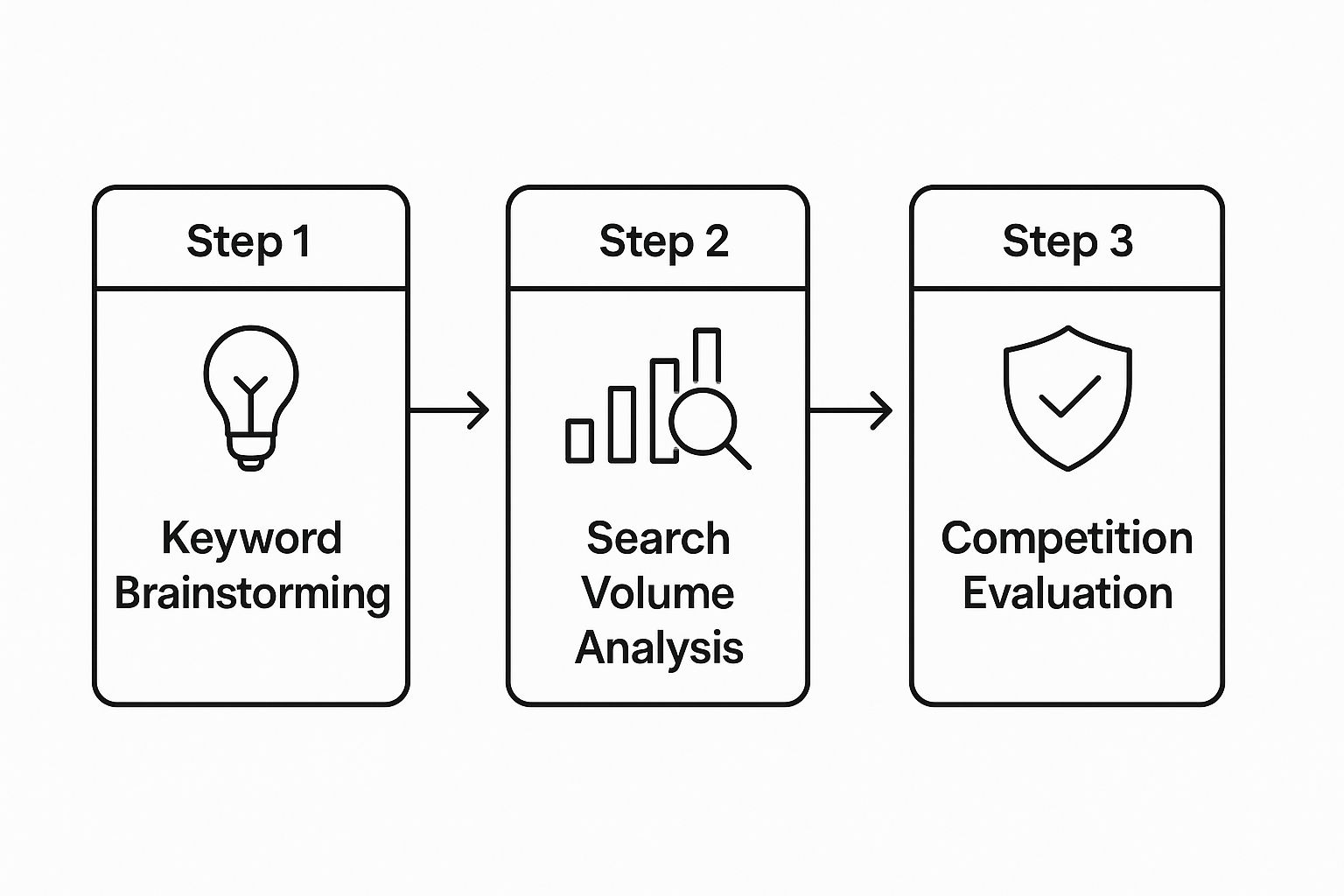
Following a process like this ensures your keyword selection is strategic and based on real data, not just a random list of terms someone at an agency thought sounded good.
Auditing The Leaks In Your Funnel
Another area where big agencies consistently fall short is auditing conversion tracking. Sure, they’ll make sure it’s “working,” but a junior manager won't scrutinize it for accuracy or hidden opportunities. Is your account tracking genuine leads or just vanity metrics like PDF downloads? Are you tracking phone calls correctly? A tiny error here can send you optimizing for completely the wrong outcomes.
I personally and meticulously review every single conversion action to ensure it aligns with a real business objective. This is how we know which campaigns are actually driving revenue versus those that are just generating noise.
An audit isn't about finding things to change just to look busy. It's about finding the 20% of issues that are causing 80% of the wasted spend. This is the key difference between agency tinkering and true expert optimization.
Spotting these profit leaks requires a specific, investigative approach that a junior account manager simply isn't trained for. Here are some of the most common—and costly—problems I uncover all the time:
Keyword Cannibalization: This is when multiple ad groups are fighting for the same keywords. You’re literally bidding against yourself, driving up your own costs and completely muddying your performance data.
Wasted Spend on Search Terms: I always dive deep into the Search Terms Report to find out exactly what people are typing before they click. You would be shocked at how much budget is wasted on totally irrelevant queries. A robust negative keyword list, built from this report, is your single best defense.
Misaligned Campaign Settings: Basic settings for location targeting, ad scheduling, and device bidding are often just left on default by agencies. A few quick adjustments here can immediately stop your ads from showing to the wrong people, in the wrong places, at the wrong times.
This forensic audit sets the stage for everything that comes next. Without this solid foundation, any attempts you make to scale or optimize are just expensive guesswork. It’s this deep, personalized analysis that sets an expert-led approach apart and is the first real step to improving Google Ads performance for the long term.
Mastering Keywords to Attract High-Intent Buyers

Keywords are the absolute foundation of your Google Ads campaigns. They're the bridge between what someone needs and the solution you're selling. But this is exactly where many agencies get lazy, stuffing accounts with generic, broad keywords that burn through cash without ever reaching a qualified buyer.
If you really want to improve Google Ads performance, you have to get obsessed with keyword intent.
This means looking past the obvious, high-competition terms. The real money is in long-tail keywords—those longer, super-specific phrases that tell you a user is much closer to pulling out their wallet. A search for "shoes" is just window shopping. A search for "men's waterproof trail running shoes size 11" is a buyer on a mission. As a solo expert, I focus on digging up these high-value terms that bloated agencies often miss because it takes serious, granular research.
This detailed approach ties directly into how I use keyword match types to control who sees your ads and, just as importantly, how much you pay for each click.
Wielding Match Types to Control Traffic Quality
Google gives you three main tools to manage your keyword targeting: Broad Match, Phrase Match, and Exact Match. Using them strategically is a non-negotiable part of protecting your budget. Too often, agencies default to Broad Match to pump up click volume for their reports, but this is a classic vanity metric that leads to irrelevant traffic and wasted ad spend.
As a dedicated consultant, my approach is far more disciplined. I always start with tighter controls.
Exact Match: This is my go-to for high-intent, bottom-of-the-funnel keywords. It gives you the most control possible, ensuring your ad only appears for searches that are an identical match to your term.
Phrase Match: I use this to carefully expand reach, capturing searches that include your target keyword in the right order. It brings in a bit more volume without opening the floodgates to totally unrelated queries.
Broad Match: This tool must be handled with extreme caution. I typically only use it when paired with a rock-solid negative keyword list and smart bidding. An unmanaged Broad Match keyword is one of the fastest ways I've seen to completely drain an account's budget.
The goal isn't just to get clicks; it's to get the right clicks. By starting with stricter match types and expanding intelligently, I make sure your ad spend is laser-focused on users who are actually likely to convert—a level of detail that often gets lost in a high-volume agency setting.
The Secret Weapon That Saves Thousands
The single most powerful—yet criminally underused—tool for boosting performance is the negative keyword list. Think of it as your account’s bouncer, actively stopping your ads from showing up on irrelevant searches.
Most agencies add a few obvious negatives when they launch a campaign and then never touch it again. This is a huge mistake.
Building a truly effective negative keyword library is a relentless, ongoing process that I own completely. It involves two key strategies:
Proactive Negatives: Before a single ad goes live, I build a foundational list of terms I already know are irrelevant. If I’m working with a luxury furniture store, this list would immediately include words like "free," "cheap," "used," or "DIY."
Reactive Negatives: This is the critical, day-to-day work. I obsessively monitor the Search Terms Report to see the actual search queries triggering your ads. Anything that doesn't fit gets added straight to the negative list.
Here’s a real-world example: A client selling high-end "custom wood tables" was wasting hundreds of dollars on clicks from people searching for "wood table repair plans." By simply adding "repair" and "plans" as negative keywords, we immediately stopped that budget leak. Those funds were then reallocated to terms that actually drove sales.
This is the kind of meticulous, hands-on management that makes all the difference and that you simply don't get from a set-and-forget agency.
Crafting Ad Copy and Landing Pages That Convert
Getting someone to click your ad is just the start. The real challenge—and where most ad spend is either won or lost—is turning that click into a customer.
This is where the cookie-cutter approach favored by bloated agencies completely falls apart. They often recycle generic ad copy and dump all traffic onto a one-size-fits-all homepage. Honestly, it's a death sentence for your conversion rates.
As a dedicated expert, I know the ad and the landing page are two halves of the same conversation. My job isn’t just to get a cheap click; it’s to create a seamless, persuasive journey from the search results page all the way to a thank you page. This requires a deep, almost psychological approach to writing ad copy and a relentless focus on landing page optimization.
The Psychology of a Click That Actually Converts
Great ad copy does more than just list features. It taps directly into the user's emotional state and speaks to their problem. Are they frustrated? In a hurry? Searching for a high-stakes solution? The words you choose matter—a lot.
A large agency might test one or two ad variations and call it a day. I treat every single ad group like its own mini-laboratory. I'm constantly testing multiple headlines, descriptions, and calls-to-action to find the precise combination that resonates most deeply.
Let’s say a client sells emergency plumbing services. They aren't just selling "plumbing." They're selling peace of mind.
Lazy Agency Ad Headline: "Local Plumbing Services - Call Us"
Expert-Crafted Ad Headline: "24/7 Emergency Plumber - Fast Relief From Leaks & Floods"
See the difference? The second headline connects emotionally and promises a specific, urgent solution. This is the level of detail required to improve Google Ads performance, and it's a level of detail that gets completely lost when your account is just one of fifty being managed by a junior employee.
Message Match: The Bridge to Higher Conversions
If there's one thing that separates high-performing accounts from the ones that bleed money, it's message match.
The principle is simple: the promise you make in your ad must be immediately and obviously fulfilled on the page they land on. When a user clicks an ad for "men's waterproof trail running shoes," they'd better land on a page showcasing exactly that—not a generic "men's shoes" category page.
When message match breaks down, it creates instant confusion and friction, causing users to bounce. That bounce sends a clear signal to Google that your page isn't relevant, which tanks your Quality Score and drives up your costs.
A solo consultant obsesses over this connection. I make sure every ad group has its own dedicated, hyper-relevant landing page. Is it time-consuming? Absolutely. But it's essential for maximizing your return on ad spend, and it's the kind of detailed work agencies focused on their own scale simply won't do.
Turning Your Landing Page Into a Conversion Machine
A great landing page isn't about flashy design. It’s a focused, frictionless tool built for one purpose and one purpose only: conversion.
After nailing the message match, I optimize pages around these core principles:
A Crystal-Clear Value Proposition: What do you offer, and why should they choose you over anyone else? This has to be communicated above the fold in a single, powerful headline.
Frictionless Experience: Get rid of all the noise. I remove distracting navigation links, annoying pop-ups, and anything else that could pull the user away from the primary call-to-action.
Instant Trust Signals: People buy from businesses they trust. I build that trust by strategically placing social proof like testimonials, case studies, trust badges (like BBB or security seals), and clear, easy-to-find contact information.
Of course, what works varies wildly by industry. For instance, recent benchmarks from Google Ads benchmarks across different sectors show Dental Services converting around 10.77% because of high urgency. Meanwhile, the Apparel & Fashion industry sees a much lower 2.15%, reflecting a longer, more considered buying journey. Understanding these nuances is critical for setting realistic goals.
But remember, you can't optimize what you can't measure. Flawless conversion tracking is the non-negotiable first step before you even think about ad copy or landing pages. For a detailed walkthrough, check out our guide on how to [fix your Google Ads conversion tracking](https://www.cometogether.media/single-post/fix-your-google-ads-conversion-tracking). It's the only way to know for sure what's actually working.
Using AI and Smart Bidding Like an Expert

Automation is an incredible tool in Google Ads, but it’s also where many agencies make a huge, costly mistake. They treat AI and Smart Bidding as a “set it and forget it” button, handing over all control without giving the machine the right directions. This is precisely why so many automated campaigns fall flat.
The real way to improve Google Ads performance isn't to fight automation—it's to become its expert guide. As a solo consultant, my job is to be the pilot for Google’s AI, not just a passenger along for the ride. I make sure the machine gets exactly what it needs to make the smartest decisions for your business, not just any business.
It’s the difference between having a powerful tool work for you versus just letting it run wild.
Feeding The Algorithm What It Craves
Google's AI is only as smart as the data you give it. Garbage in, garbage out. Bloated agencies often just flip the switch on Smart Bidding without first checking if the data foundation is solid. That’s a recipe for erratic results and wasted ad spend.
Before I even think about enabling an automated strategy, I conduct a meticulous audit of the conversion tracking. Is it accurate? Is it tracking real business goals or just vanity metrics? This is the absolute non-negotiable first step.
Here’s what high-quality data looks like in the real world:
Accurate Conversion Values: For an e-commerce store, this means passing the actual revenue for every single transaction. For lead gen, it’s about assigning different values to leads—a "Request a Quote" form fill is obviously more valuable than a newsletter signup.
Enough Conversion Volume: Smart Bidding needs data to learn. You can't expect it to work magic with just a few conversions. I often consolidate campaigns to make sure the algorithm has at least 30-50 conversions in a 30-day window before I'll fully trust strategies like Target CPA or Target ROAS.
Perfect Tracking Implementation: I get in there and personally verify that the tracking tags are firing correctly on every important page. No duplicates, no errors, no missed opportunities.
An expert doesn’t just turn on Smart Bidding; we create the perfect environment for it to succeed. This hands-on prep work is what separates a finely tuned, profitable automated campaign from a costly, unpredictable agency mess.
Steering Performance Max and Smart Bidding
Performance Max (PMax) and other Smart Bidding strategies can drive incredible results, but they absolutely need strategic input. They are not cruise control. This is another spot where a dedicated expert brings far more value than a passive, hands-off agency.
I don’t just throw a few random images and headlines into a PMax campaign and hope for the best. I build a complete set of assets specifically tailored to different audience signals. That means giving Google high-quality videos, a range of compelling ad copy, and distinct image styles that I can later analyze to see what’s actually resonating with customers.
I also actively steer the strategy by picking the right bidding model for the right stage of the campaign. A brand new campaign might start on Maximize Clicks just to gather data quickly. Once a baseline is set, we might graduate to Maximize Conversions. And finally, when we're ready to scale profitably, we switch to Target CPA or Target ROAS.
This kind of strategic evolution is something a “set it and forget it” agency model completely misses. Guided automation is central to modern Google Ads management, and knowing how to steer the machine is what truly lowers CPA and scales campaigns intelligently. You can read more about [these vital Google Ads best practices](https://www.mastroke.com/blog/digital-marketing/google-ads-best-practices-in-2025-strategies-to-stay-ahead-of-the-curve/) to see how this thoughtful approach keeps the AI perfectly aligned with your business goals.
Continuous Optimization for Long-Term Growth
Launching a Google Ads campaign isn't the finish line; it’s just the starting gun. Where you really win—or lose—is in the days, weeks, and months that follow. This is where the gap between an engaged expert and a bloated, impersonal agency becomes a chasm.
Big agencies often fall into a "set it and forget it" trap. Once your campaign is live and hitting some basic KPIs, their attention moves on to the next client launch. This hands-off approach guarantees stagnation, missed opportunities, and a slow bleed of your ad spend as the market inevitably shifts. Your account simply stops being a priority.
The Expert Mindset of Relentless Testing
As a dedicated consultant, my real work begins after the launch. I treat every campaign like a living, breathing thing that needs constant attention to improve Google Ads performance. It’s all about a relentless cycle of testing, learning, and refining your strategy.
We aren't just guessing what might work; we're using data to prove it. This means setting up a disciplined process for testing every critical piece of your campaigns.
Ad Copy Testing: We're constantly running different headlines and descriptions against each other. What resonates more? Emotional triggers or logical arguments? Benefit-focused copy or feature-driven text? We find out by testing.
Landing Page Experiments: A click is worthless if it doesn't convert. We run A/B tests on your landing pages to pinpoint which layout, call-to-action, or trust signals actually turn visitors into paying customers.
Audience Signal Refinement: For automated campaigns like Performance Max, you have to feed the machine the right data. We are always refining audience signals and testing new creative assets to give the algorithm higher-quality inputs for better outputs.
A junior account manager at a large agency might get around to testing a new headline once a quarter. As your dedicated expert, I am testing multiple campaign elements every single week. This pace of learning is something a slow, bureaucratic agency structure simply cannot match.
Making Decisions and Maintaining Momentum
This continuous testing creates a constant stream of performance data. The real skill is knowing how to read that data and act on it—fast. It’s about spotting trends before they become problems and identifying winning elements you can scale aggressively.
For example, if a specific ad creative starts pulling in a much higher click-through rate, we don't just sit back and watch. I dig in to figure out why it's outperforming. Is it the image? The headline? The offer? I then build new variations based on that winning formula and double down.
On the flip side, I am ruthless about cutting what isn't working. There's no room for emotional attachment to a keyword or an ad that consistently fails to deliver ROI. This agility—the ability to pivot quickly and reallocate budget from the losers to the winners—is the hallmark of expert, hands-on management. It ensures every dollar you invest is working as hard as possible.
This entire process is a core part of the most effective [search engine marketing strategies](https://www.cometogether.media/single-post/top-search-engine-marketing-strategies-to-boost-your-roi) that deliver sustainable, long-term growth and a real return on your investment.
Your Questions Answered by a Google Ads Expert
When you're trying to improve your Google Ads performance, you don't need high-level theories from a disconnected agency. You need clear, direct guidance from someone who has been in the trenches.
I’ve heard these questions time and again from businesses tired of wasting money on over-priced agencies. Let's get you some straight answers.
How Long Does It Take to See Improved Google Ads Performance?
This is always the first question, and for good reason. While some quick wins—like cutting out a few high-cost negative keywords—can show positive results within days, true, lasting improvement takes a bit more patience.
For significant changes that come from a structural account overhaul, Quality Score improvements, or a new bidding strategy that needs to learn, you should realistically expect to see meaningful results within 30 to 90 days.
The key isn't a single magic fix; it's the consistent, data-driven management you get from an expert, not the sporadic attention from an agency. My initial audit will immediately pinpoint the low-hanging fruit for fast improvements, but sustainable ROI growth is a marathon, not a sprint.
Why Is My Quality Score So Low?
A low Quality Score is a classic symptom of a deeper problem. It’s Google’s way of telling you there's a major disconnect between what someone searched for, the ad you showed them, and the page they landed on. This is often the result of an agency's lazy, templated approach.
The most common culprits I see usually fall into one of these categories:
Poor Ad Relevance: Your ad copy simply doesn't match the user's search intent. For example, your ad talks about "luxury shoes" but was triggered by a search for "cheap running shoes."
Weak Landing Page Experience: The user clicks your ad and finds a page that's slow, not mobile-friendly, or—worst of all—doesn't deliver on the promise your ad made.
A thorough, expert audit is the only way to accurately diagnose the specific cause. This isn’t just about tweaking a few keywords; it's about re-aligning your entire ad funnel from search to conversion.
Can I Improve Performance Without Increasing My Budget?
Absolutely. In fact, this is the entire point of expert-led optimization and the core difference between my approach and that of a bloated agency. The goal is to make every dollar you currently spend work harder.
An agency might tell you the only way to get more conversions is to increase your budget. I will show you how to get more conversions from the budget you already have.
By systematically eliminating wasted spend on irrelevant clicks, pausing underperforming ad groups, and strategically improving your Quality Score to lower your cost-per-click, we free up a significant portion of your budget. That money is then reallocated to your top-performing campaigns, driving more conversions without you having to spend a single extra dollar. It’s about spending smarter, not just spending more.
Data from 2025 shows just how important industry-specific strategy is. The overall average click-through rate (CTR) for Google Search Ads is 6.66%, but this hides massive variations. Arts & Entertainment enjoys a stellar 13.10% CTR, while Attorneys & Legal Services see a lower 5.97%. This highlights why a generic, one-size-fits-all agency approach is doomed to fail; you must tailor your strategy to your industry's specific benchmarks. You can learn more about these industry-specific benchmarks to see how your campaigns stack up.
Ready to stop guessing and start seeing real results from your Google Ads investment? At Come Together Media LLC, I provide the one-on-one expert guidance you need to move beyond the frustration of bloated agencies and wasted ad spend. Let's build a strategy that works for your business. [Book your free, no-commitment consultation today](https://www.cometogether.media) and let’s improve your Google Ads performance together.




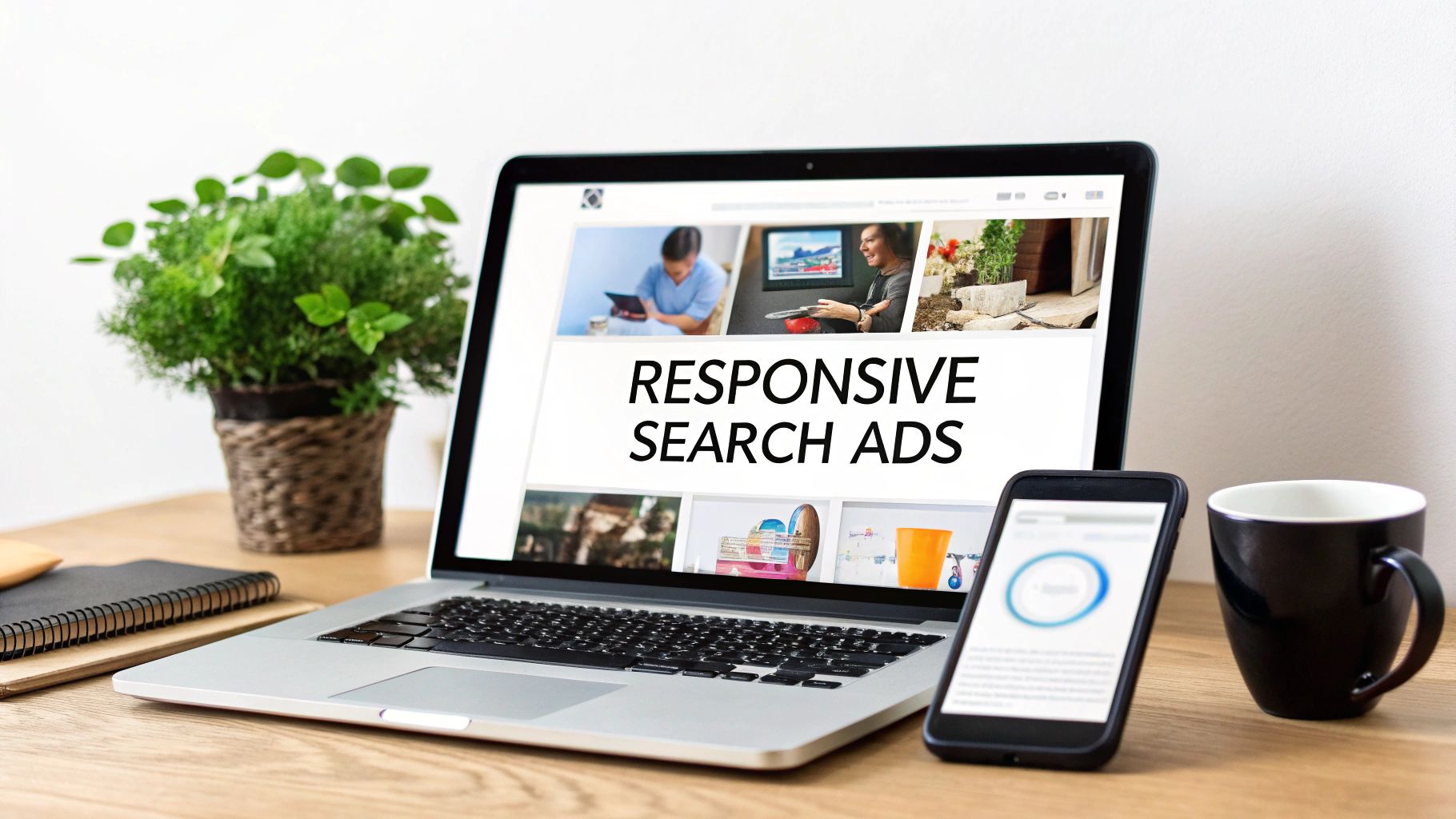

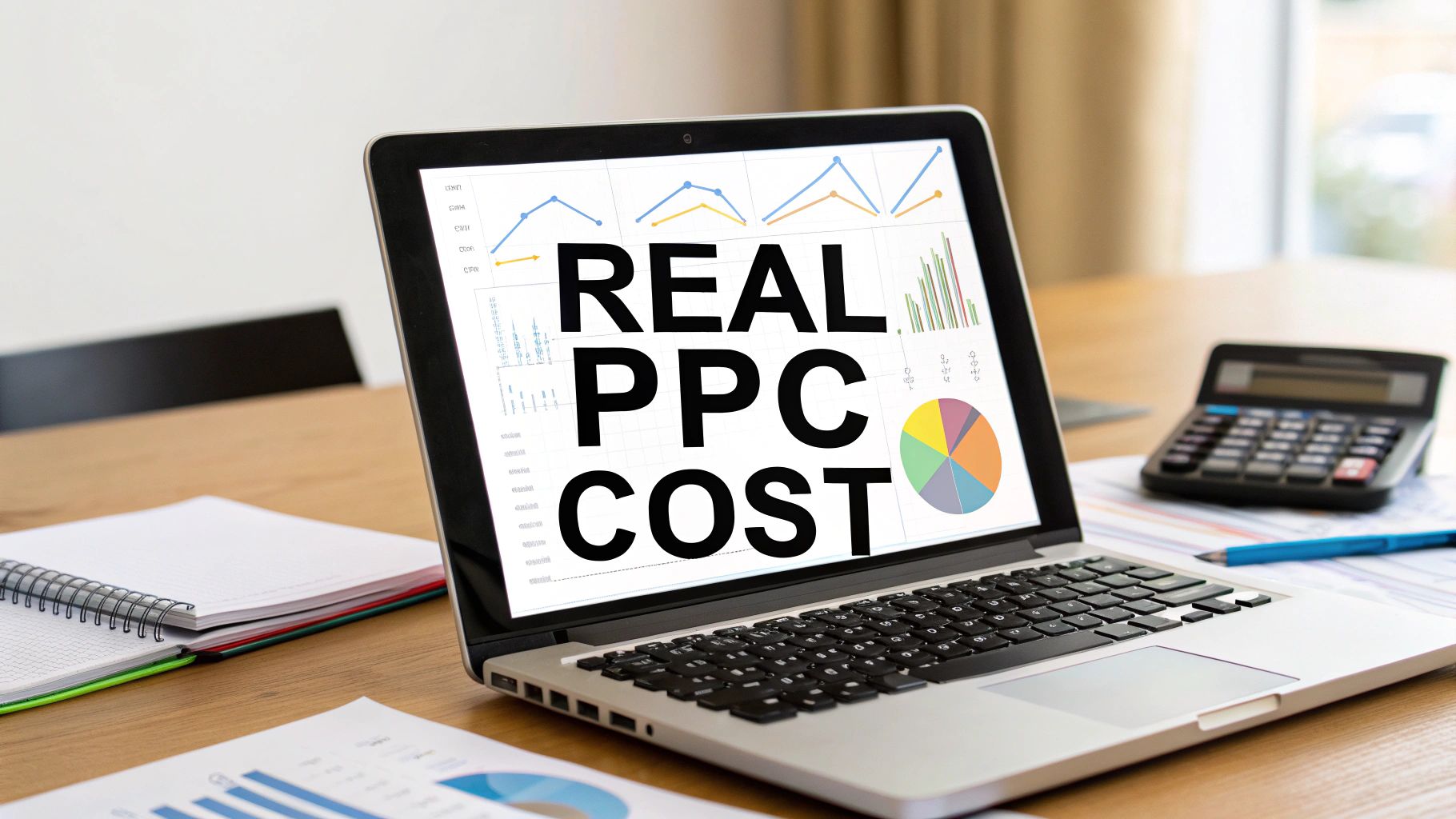
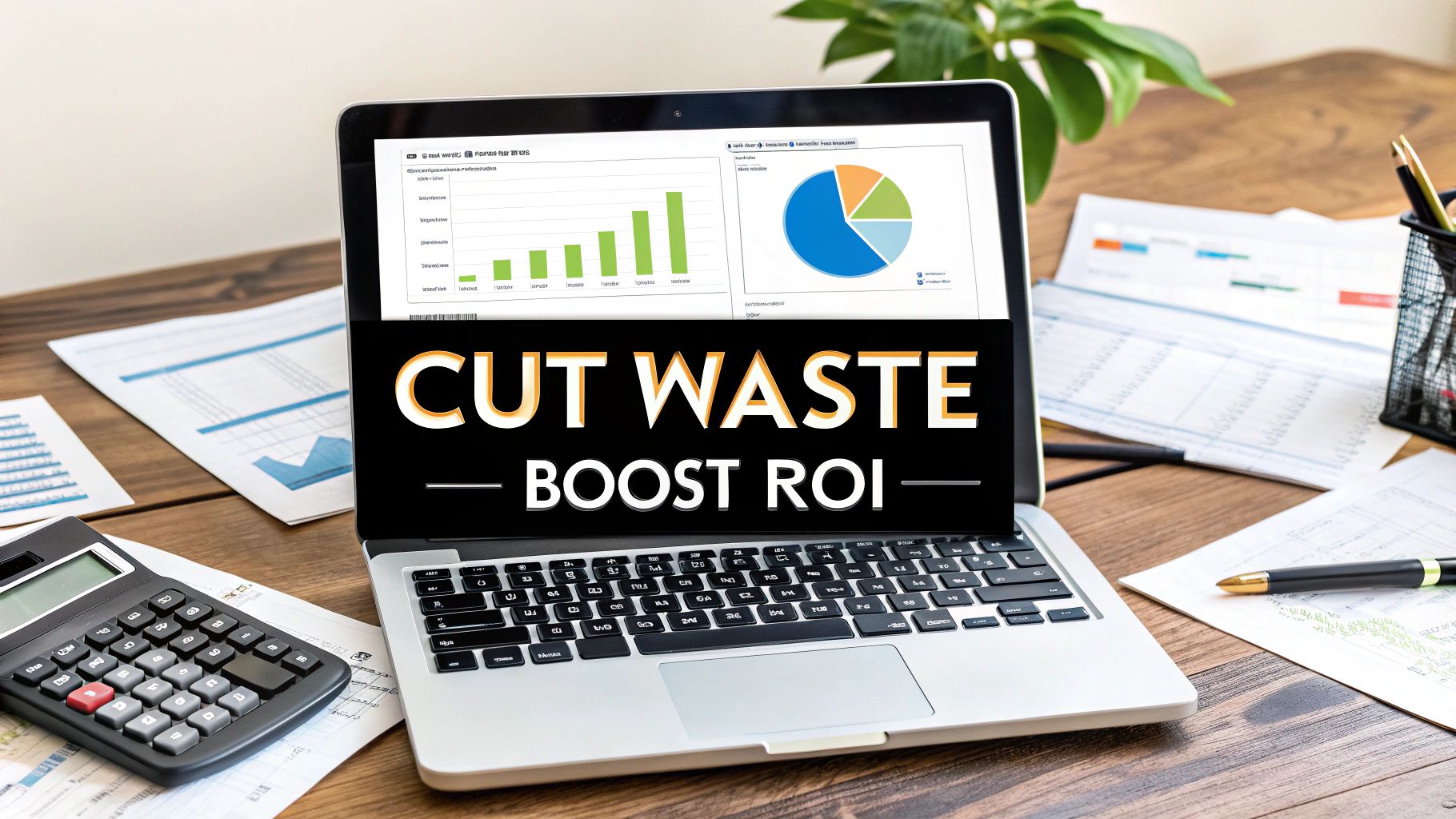
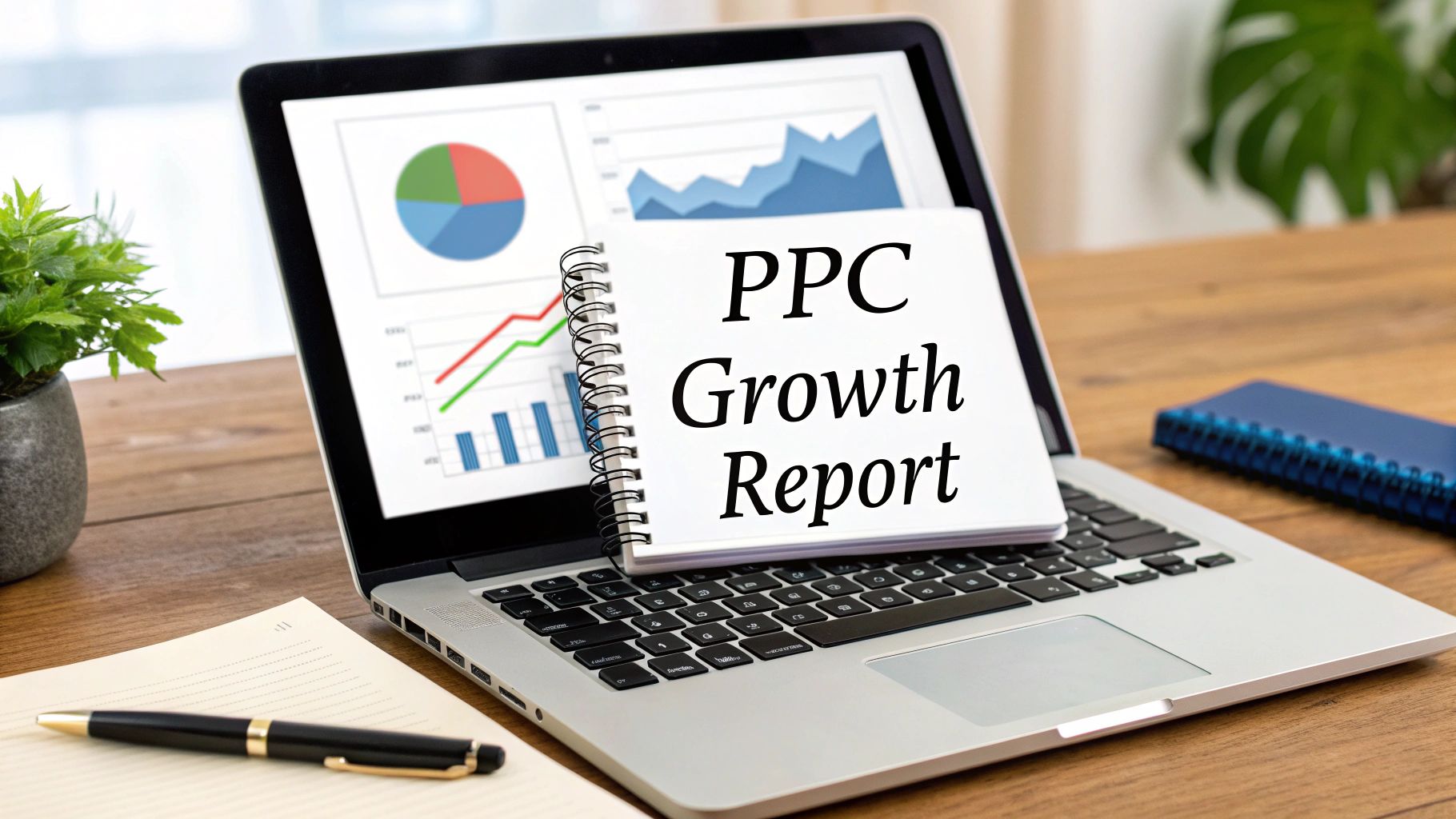
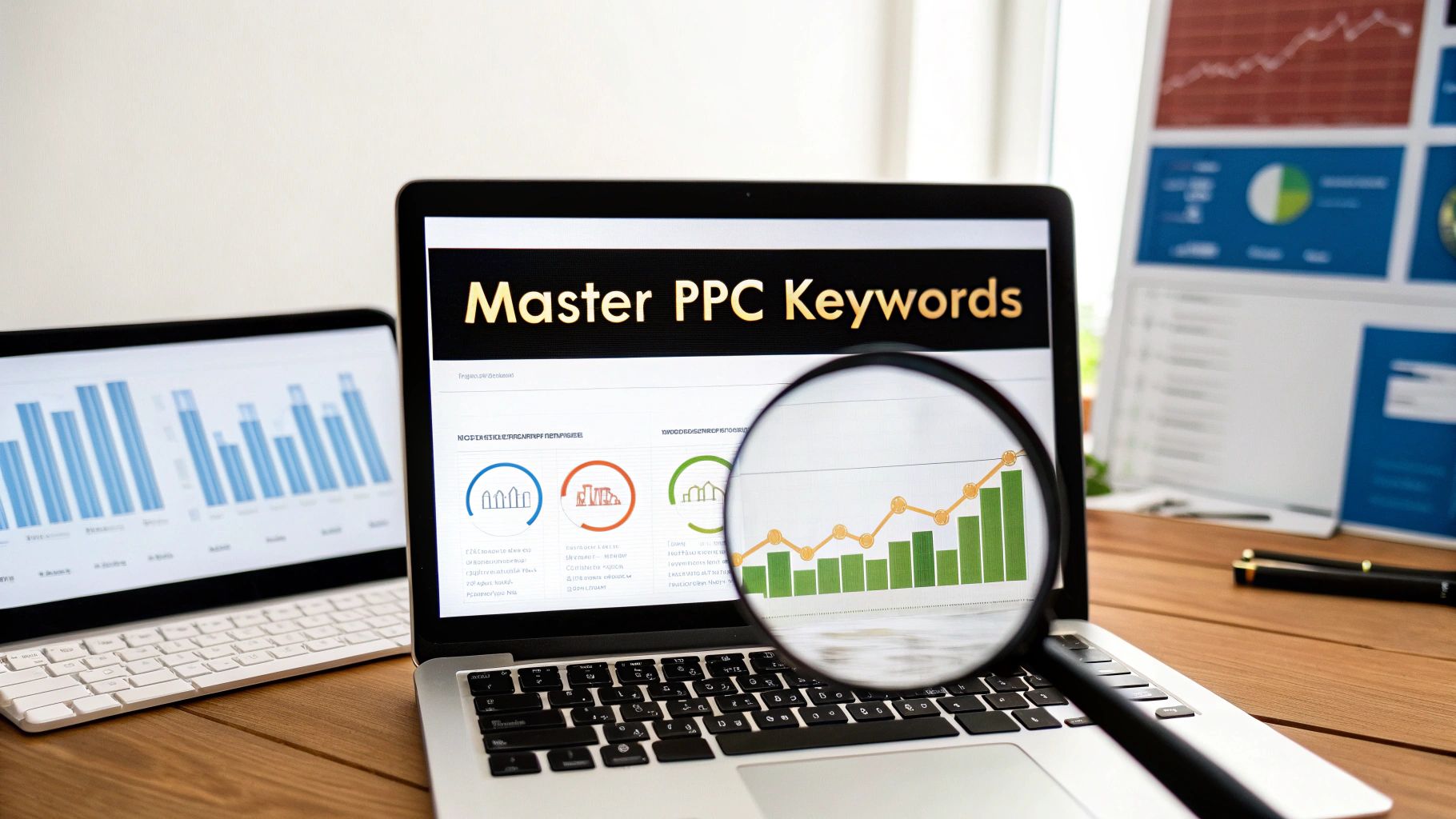
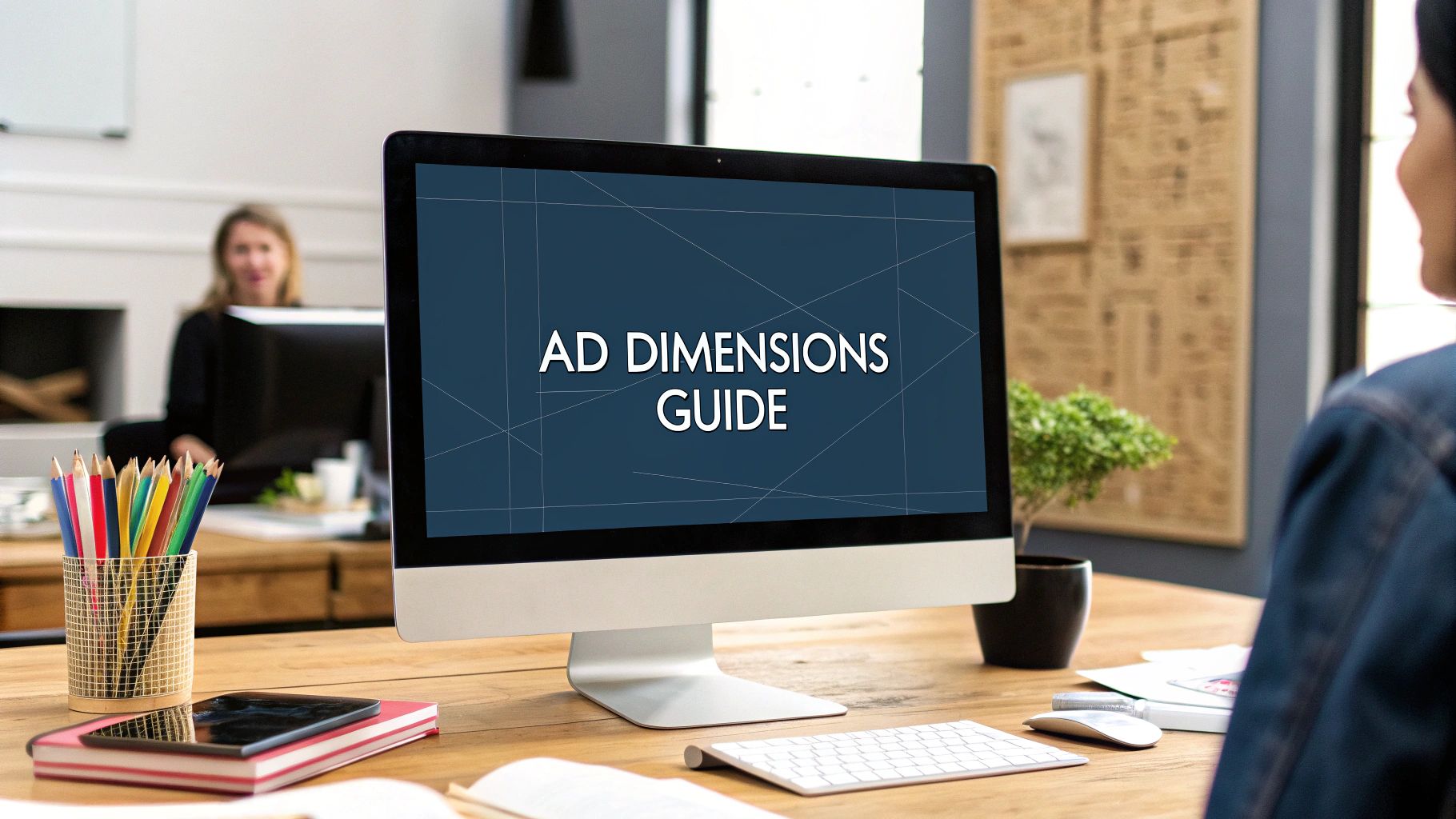
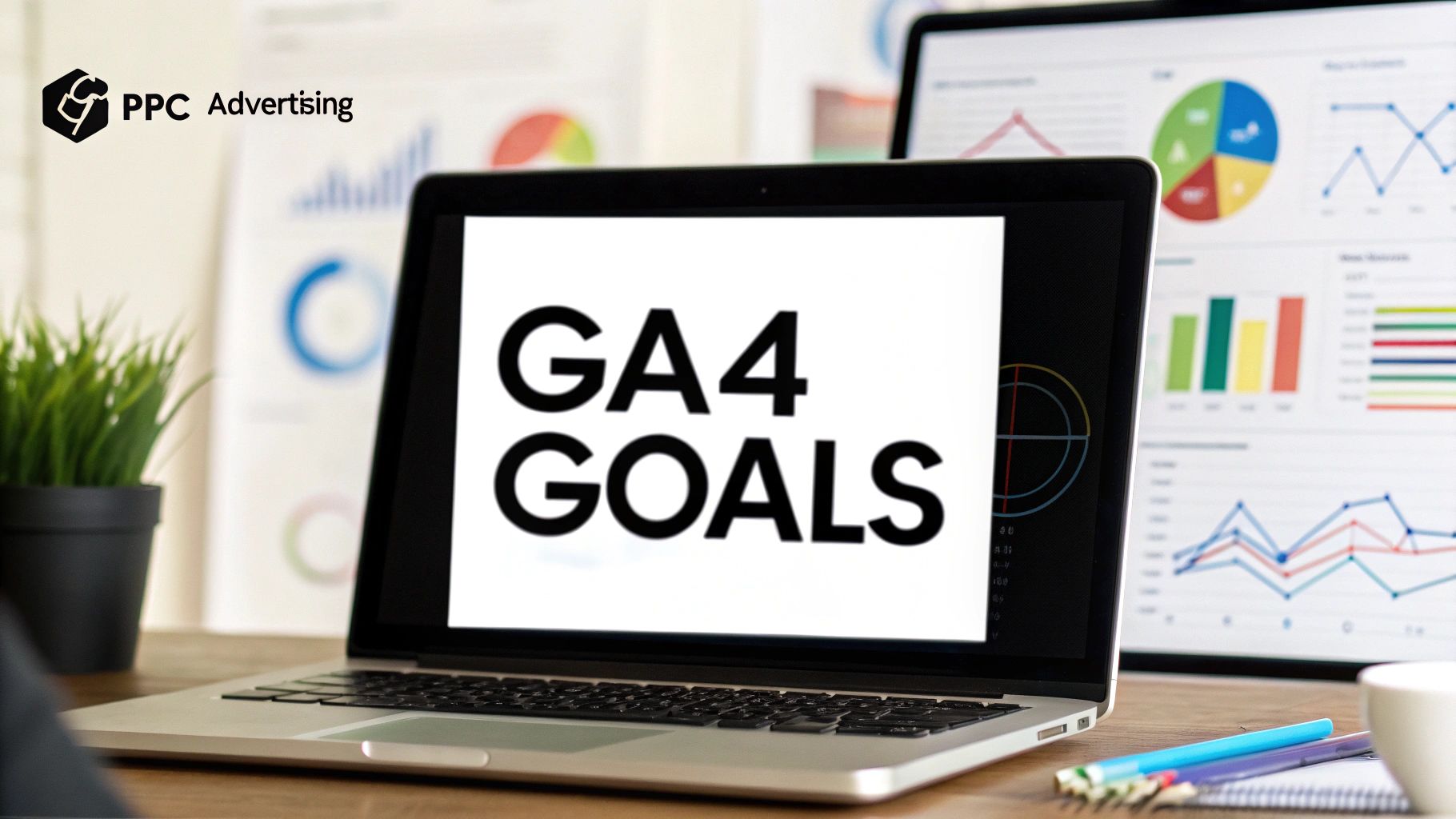
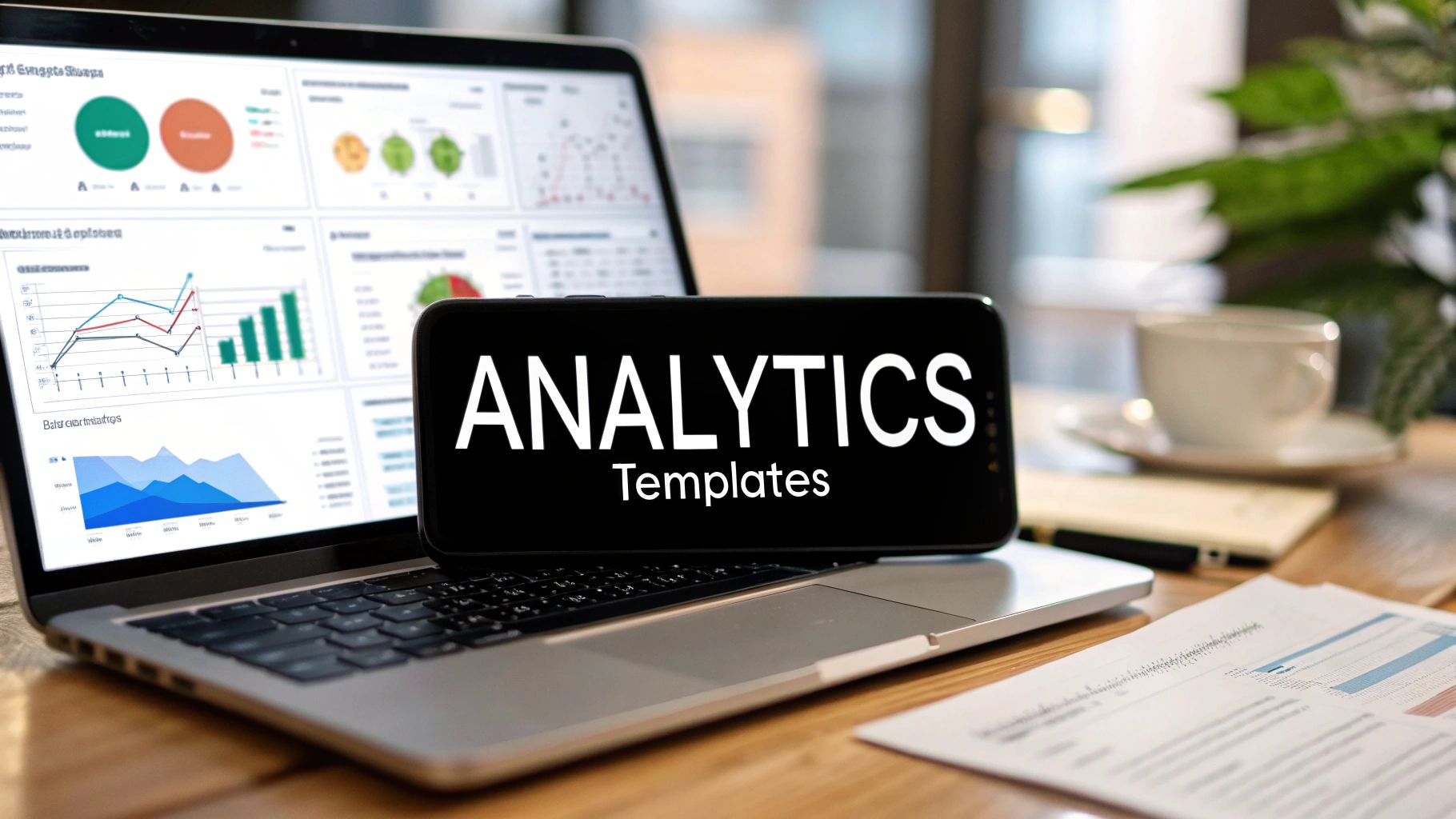
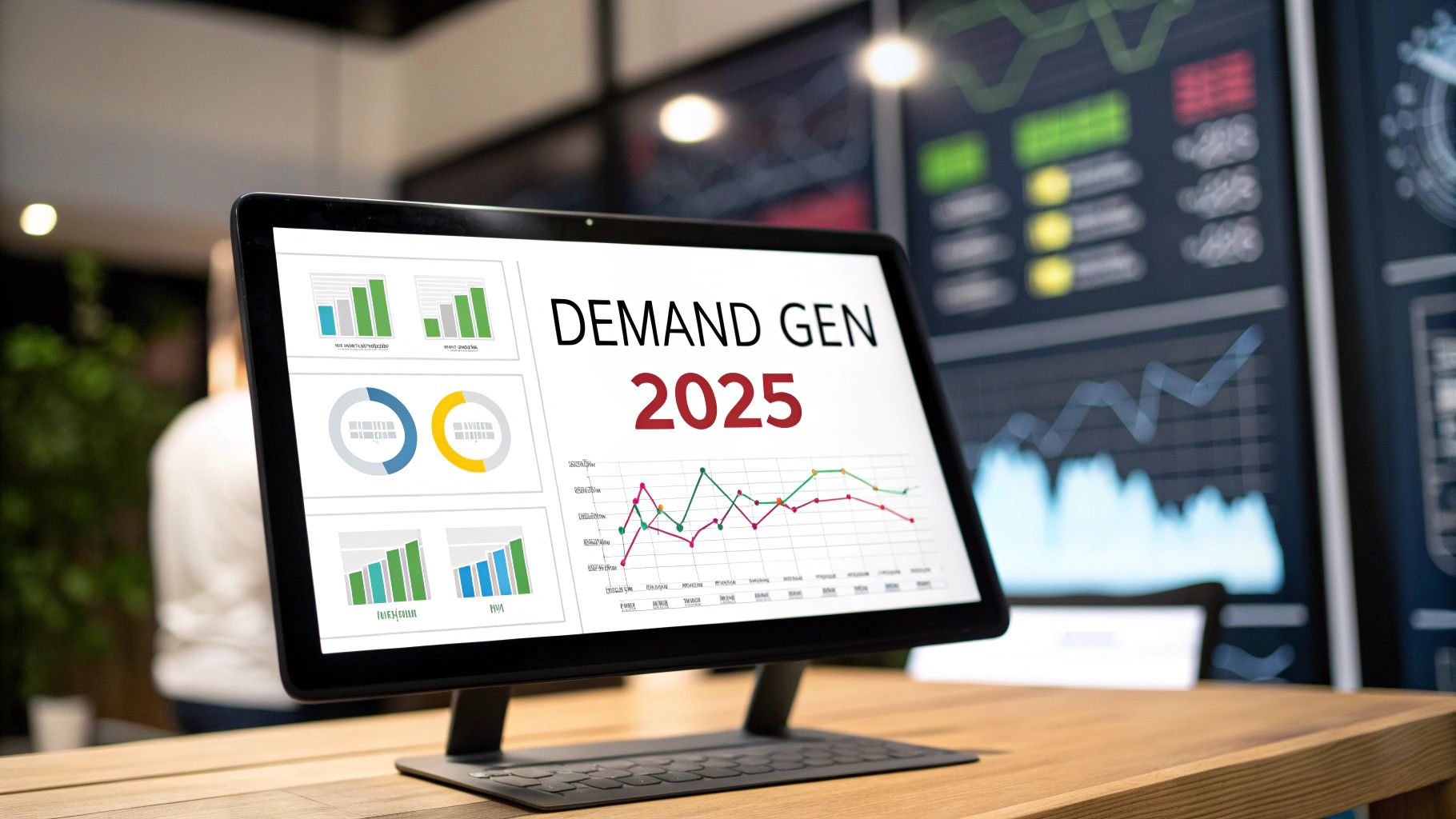
Comments